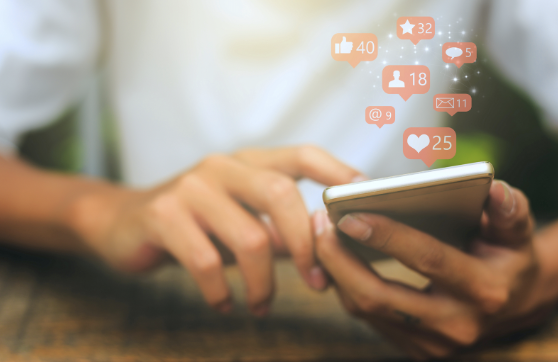
Teenagers’ use of social media has become pervasive in the digital era. It’s not surprising that teenagers spend a large portion of their day on platforms like Facebook, Instagram, Snapchat, and TikTok because they provide instant connectivity and a glimpse into the lives of classmates and celebrities.
Social media clearly provides many advantages, such as better communication and information access, but it also has a significant effect on teen mental health. To examine the complex relationship between social media use and adolescent mental health, it’s important to look at the advantages and disadvantages of social media’s impact on adolescents’ mental health.
“I think social media has impacted my life in a positive way, social media has opened doors for new people in my life. Also makes me feel accompanied all the time, as I never have to be alone, social media has connected me to the world,” Juanita López, Grade 11, said.
For teenagers, the potential of social media to foster connections is one of its most important benefits. Teenagers are capable of sustaining friendships and family ties even when they live apart. It gives shy or introverted people a way to interact socially and connect with others who share their interests.
“Social media can have its benefits, but also its dangers. I consider that social media has become a great tool, especially for educational resources, but also warns me about the social comparisons and validation seeking teenagers may have,” TCS Parent, said.
Social media can be used as a teaching tool, providing resources for finding help as well as information on self-care and mental health awareness. Teens can gain insightful advice from experts, advocates, and peers who have dealt with related issues, but may also increase the propensity to compare themselves to others is a problem that is prominent on social media. Teenagers frequently witness edited, idealized depictions of the lives of their classmates, which can cause feelings of inadequacy and low self-worth. Unrealistic beauty standards and lifestyle expectations may result from repeated exposure to artfully designed images. Also for many teenagers, the need for likes, comments, and follows can develop into an unhealthy fixation. Relying on social media for approval can lead to addictive behavior and a sense of value based on online popularity, both of which have a negative impact on one’s self-esteem.
“I would describe social media as a double-edged sword. Communication, information access, and networking opportunities are just some of the many advantages technology provides, but it also puts their mental health, privacy, and academic success at risk,” Teacher Bradford Stretton, said.
Even though social media express creativity, networking, and career opportunities as well as offer information access and learning opportunities, students could develop social media addiction as a developing issue. Excessive use can result in bad time management, disregard for obligations, and a decrease in in-person social connections. Also, late-night social media use can disrupt sleep patterns, resulting in weariness and sleep deprivation, which can harm students’ academic performance and general well-being.
“Social media has also caused some issues, not only in myself but also in my peers. The majority of us acknowledge that social media has led to many of our insecurities, as well as anxiety, and depression. Some of my classmates have even experienced cyberbullying, we must do something to change this,” Juanita Lopez, Grade 11 student, said.
Students who use social media may experience despair, anxiety, and feelings of worthlessness. Low self-esteem and concerns with body image can result from ongoing exposure to carefully curated images and the pressure to present an idealized version of oneself. Students who engage in cyberbullying can become both victims and perpetrators on social media sites. This may have negative psychological and emotional effects.
There is a lively and developing debate on how social media affects teen mental health. It offers unquestionable advantages, but it also carries considerable hazards. The opinions of students, parents, and teachers serve as a timely reminder of the value of promoting a healthy and responsible relationship with social media. The thought among society remains: the digital sphere must continue to be a place of empowerment and connection while preserving the mental health of the future generation.


